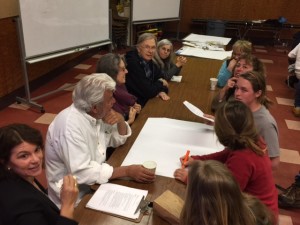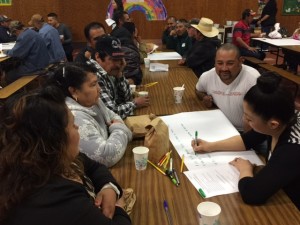On March 23, sixty-five people congregated in the Pescadero Elementary School Multipurpose room to watch the film “Food Chains.” The group consisted of farmworkers and consumers, teachers and students—all gathered to learn more about food systems and food justice.
The film, according to its makers, “focuses on an intrepid group of Florida farmworkers battle to defeat the $4 trillion global supermarket industry through their ingenious Fair Food program, which partners with growers and retailers to improve working conditions for farm laborers in the United States.” To date, twelve major retailers have signed on to the campaign including Walmart, Whole Foods, Trader Joe’s, McDonalds, the YUM Brands, Chipotle, Burger King, Aramark, Compass Group, Bon Appetit, Sodexo, and Subway. Those companies, according to the CIW, now “pay a small Fair Food premium which tomato growers pass on to workers as a line-item bonus on their regular paychecks. (Between January 2011 and October 2015, $20 million in Fair Food premiums were paid into the Program.) Through the Program, these buyers support a wage increase through paying an additional penny per pound and require a human-rights-based Code of Conduct to be implemented on the farms that grow their tomatoes.”
“Food Chains” begins by addressing the specific challenges the Florida tomato workers face and then zooms out for a broader look across the country and even focuses briefly on California. The story follows the early morning routines of farmworkers before they go to work in the pre-dawn, the struggle to earn even a minimum wage in some parts of the country, and the reality that even a one-cent increase in the cost of produce would significantly improve the lives of workers. The principal targets of criticism are the large supermarket conglomerates, which hold a disproportionate amount of the power in the food system.
The six-day hunger strike that is chronicled in the film was launched by the CIW in Florida and targeted Publix, one of the largest supermarket chains in the United States, based in Lakeland, Florida. The company, along with Safeway, Kroger, and Wendy’s, have also refused to sign the Fair Food premium.
In the end the film points out that while groups like the United Farm Workers (UFW) achieved historic successes for farmworker justice, “farm labor today remains one of the most difficult and most underpaid jobs in America.” The farmworker movement led by Cesar Chavez in California in the 1960s was prominently featured in the film—fitting for a screening to kick off Farmworker Awareness Week, which ends on Cesar Chavez Day.
And that’s what those sixty-five people were present for: an opportunity to be more aware of the issues of farmworkers.
The film was perfect for the South Coast community and the Puente staff that organized the viewing knew it.
Community Health Coordinator Molly Wolfes first saw “Food Chains” at the Western Forum for Migrant Health and was struck by how relevant the California history portrayed in the movie continues to be for the current issues of the South Coast. Family Education Manager Arlae Alston appreciated that the history of agriculture and workers is presented in the film in a way that is respectful of all parties, and Community Outreach Coordinator Ben Ranz felt that the film’s concentration on the need for change in huge food corporations—not individual farmers—was a particularly important point to recognize.

Ranz, Wolfes, and Alston
Alston, Ranz and Wolfes first assembled a bilingual group of community members who pre-screened the – preparing them to both assist in outreach as well as take on a more involved role the night of the event. After the film, that small group of promotoras, parents from Abriendo Puertas, and participants in La Sala—key community leaders—were empowered to lead small groups (in English and Spanish) of 4-7 people to talk about their personal responses to the film. Those small groups then presented their discussion to the entire group, facilitated by Puente’s Education Director Noel Chavez.
The film elicited passionate feelings from the entire room as many of the viewers were moved by the issues raised.
Some viewers said the film was hard to watch and even harder to talk about. However, the discussion of the movie gave the farmworker community a voice and a platform to talk and be heard—one of the central goals of Farmworker Awareness Week in general and the film screening in particular. This unique opportunity for both English and Spanish speakers was another meaningful step in connecting people in our community across differences.
Wolfes was reminded that at the end of the discussion, the community was in a different place. “The goal of the evening was to start a dialogue, not fix this great big problem,” she said.
Alston later wrote that people showing up after a long day of work moved her. “This tells me that our community is ready to talk about these issues,” she said. “It reminded me of a quote from Brené Brown about the meaning of the word courage –
‘Not the courage that talks about the strength in the face of pain or grief, but the courage that is to tell the story of who you are with your whole heart.’
During this night I got to witness people telling their story with their whole hearts. There was sadness and anger but there was also hope and heart. I am extremely privileged to have been there.”


Small group conversations after the movie
Ranz is inspired by the response to plan upcoming workshops on workers’ rights and other legal issues that directly affect this community. Some participants even expressed interest in learning how to register to vote to start to participate in the system. For the next film festival, Ranz, Alston, and Wolfes hope to spur viewers to action in response to the needs of the community. Ranz dreams of a bus trip to Sacramento where farmworkers can advocate for themselves.
Until then, the screening served as an opportunity for participants to see each other–and to hear the stories that make each of us part of the same community.
View the trailer for Food Chains here. The full film is available on Netflix.
Email us at info@mypuente.org to help plan the next film festival. To support our innovative programs, click here.


